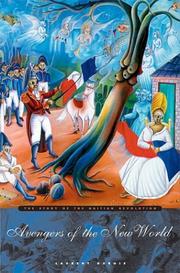| Listing 1 - 10 of 185 | << page >> |
Sort by
|
Book
ISBN: 9681643909 6076286024 Year: 1994 Publisher: México, D.F. Colegio de México
Abstract | Keywords | Export | Availability | Bookmark
 Loading...
Loading...Choose an application
- Reference Manager
- EndNote
- RefWorks (Direct export to RefWorks)
Obra de divulgación que presenta el papel relevante de la ciencia y la tecnología en el proceso de descubrimiento, conquista y colonización del Nuevo Mundo. El autor muestra como América no solo fue receptora de la ciencia europea, sino que fue al mismo tiempo el continente en el cual se crearon las bases sobre las cuales un siglo más tarde se edificó la Revolución Científica.

ISBN: 0674013042 9780674013049 0674018265 0674034368 Year: 2004 Publisher: Cambridge, Mass. : Belknap Press of Harvard University Press,
Abstract | Keywords | Export | Availability | Bookmark
 Loading...
Loading...Choose an application
- Reference Manager
- EndNote
- RefWorks (Direct export to RefWorks)
Laurent Dubois weaves the stories of slaves, free people of African descent, wealthy whites and French administrators into an unforgettable tale of insurrection, war, heroism and victory.
Haiti --- History --- History of Latin America --- anno 1700-1799
Book
ISBN: 9681205456 6076287241 Year: 1992 Publisher: México, D.F. Colegio de México
Abstract | Keywords | Export | Availability | Bookmark
 Loading...
Loading...Choose an application
- Reference Manager
- EndNote
- RefWorks (Direct export to RefWorks)
El presente volumen contiene una compilación de artículos sobre diversos temas historicos publicados originalmente en le revista Historia Mexicana. esta compilacion, al igual que las comprendidas en otros volumenes de ls series Lecturas de Historia Mexicana, es una de las varias publicaciones editadas para conmemorar los cincuenta anos del Centro de Estudios Historicos de El Colegio de México, y contribuira sin duda a difundir entre los interesados un valioso material que de otro modo tal vez escaparia a su atencion
History of Latin America --- anno 1500-1599 --- Latin America --- History --- History of the Americas
Book
ISBN: 9781469625621 1469625636 9781469625638 9781469625645 1469625644 1469625628 9798890849533 Year: 2015 Publisher: Chapel Hill
Abstract | Keywords | Export | Availability | Bookmark
 Loading...
Loading...Choose an application
- Reference Manager
- EndNote
- RefWorks (Direct export to RefWorks)
On January 1, 1804, Haiti shocked the world by declaring independence. Historians have long portrayed Haiti's postrevolutionary period as one during which the international community rejected Haiti's Declaration of Independence and adopted a policy of isolation designed to contain the impact of the world's only successful slave revolution. Julia Gaffield, however, anchors a fresh vision of Haiti's first tentative years of independence to its relationships with other nations and empires and reveals the surprising limits of the country's supposed isolation. Gaffield frames Haitian independence as both a practical and an intellectual challenge to powerful ideologies of racial hierarchy and slavery, national sovereignty, and trade practice. Yet that very independence offered a new arena in which imperial powers competed for advantages with respect to military strategy, economic expansion, and international law. In dealing with such concerns, foreign governments, merchants, abolitionists, and others provided openings that were seized by early Haitian leaders who were eager to negotiate new economic and political relationships. Although full political acceptance was slow to come, economic recognition was extended by degrees to Haiti--and this had diplomatic implications. Gaffield's account of Haitian history highlights how this layered recognition sustained Haitian independence.
History of Latin America --- anno 1800-1899 --- Haiti --- History --- Foreign relations
Book
ISBN: 9789004528673 9789004528680 9004528687 Year: 2023 Publisher: Leiden, The Netherlands : Koninklijke Brill nv,
Abstract | Keywords | Export | Availability | Bookmark
 Loading...
Loading...Choose an application
- Reference Manager
- EndNote
- RefWorks (Direct export to RefWorks)
This book combines the political and economic history of silver flows all over the world, detailing the workers, entrepreneurs, and authorities of the Spanish Empire.
Silver mines and mining --- History. --- History of Latin America --- anno 1500-1799 --- anno 1800-1899 --- Potosí
Book
ISBN: 149621322X 1496223403 1496224108 9781496224101 9781496213228 9781496223401 Year: 2021 Publisher: Lincoln
Abstract | Keywords | Export | Availability | Bookmark
 Loading...
Loading...Choose an application
- Reference Manager
- EndNote
- RefWorks (Direct export to RefWorks)
"This volume includes essays that explore the history of tourism and its promotion and development throughout Latin American and the Caribbean in the twentieth century"--
Tourism --- History --- Latin America --- Caribbean Area --- Economic conditions. --- History of Latin America --- anno 1800-1999
Book
ISBN: 9789004460331 9789004460348 9004460349 Year: 2021 Publisher: Leiden, The Netherlands : Brill,
Abstract | Keywords | Export | Availability | Bookmark
 Loading...
Loading...Choose an application
- Reference Manager
- EndNote
- RefWorks (Direct export to RefWorks)
From the late sixteenth century until their expulsion in 1767, members of the Society of Jesus played an important role in the urban life of Spanish America and as administrators of frontier missions. This study examines the organization of the Society of Jesus in Spanish America in large provinces, as well as the different urban institutions such as colegios and frontier missions. It outlines the spiritual and educational activities in cities. The Jesuits supported the royal initiative to evangelize indigenous populations on the frontiers, but the outcomes that did not always conform to expectations. One reason for this was the effect of diseases such as smallpox on the indigenous populations. Finally, it examines the 1767 expulsion of the Jesuits from Spanish territories. Some died before leaving the Americas or at sea. The majority reached Spain and were later shipped to exile in the Papal States. Readership: All interested in the history of colonial Spanish America, the role of the Catholic church in colonial Spanish America, and frontier missions. Anyone interested in historical demography. Keywords: Society of Jesus, education, Misión Popular, colegios, frontier missions, Guaraní, Sonora-Sinaloa, Chaco, Baja California, expulsion.
Christian religious orders --- History of Latin America --- Jesuits --- History. --- Missions. --- Latin America --- History
Periodical
ISSN: 19887868 02124408 Publisher: Sevilla : Universidad de Sevilla. Secretariado de publicaciones,
Abstract | Keywords | Export | Availability | Bookmark
 Loading...
Loading...Choose an application
- Reference Manager
- EndNote
- RefWorks (Direct export to RefWorks)
Latin America --- Amérique latine --- History --- Periodicals --- Histoire --- Périodiques --- politics --- economics --- society --- culture --- history of Latin America --- history of latin america --- Latin America. --- History. --- Asociación Latinoamericana de Libre Comercio countries --- Neotropical region --- Neotropics --- New World tropics --- Spanish America

ISBN: 0415928796 1315023261 1136697330 9781136697333 9781315023267 0415928788 9780415928786 9780415928793 9781136697401 1136697403 9781136697470 Year: 2002 Publisher: New York
Abstract | Keywords | Export | Availability | Bookmark
 Loading...
Loading...Choose an application
- Reference Manager
- EndNote
- RefWorks (Direct export to RefWorks)
Mestizo: a person of mixed blood; specifically, a person of mixed European and American Indian ancestry.Serge Gruzinski, the renowned historian of Latin America, offers a brilliant, original critique of colonization and globalization in The Mestizo Mind. Looking at the fifteenth-century colonization of Latin America, Gruzinski documents the mélange that resulted: colonized mating with colonizers; Indians joining the Catholic Church and colonial government; and Amerindian visualizations of Jesus and Perseus. These physical and cultural encounters crea
Mestizaje --- Mestizo culture --- Mestizo-ization --- Miscegenation --- Latin America --- Civilization. --- Civilisation --- Colonisation. Decolonisation --- History of Latin America --- Mexico
Book
ISBN: 9789004341449 9789004341456 9004341455 9004341447 Year: 2018 Publisher: Leiden Boston
Abstract | Keywords | Export | Availability | Bookmark
 Loading...
Loading...Choose an application
- Reference Manager
- EndNote
- RefWorks (Direct export to RefWorks)
In ‘Another Jerusalem’: Political Legitimacy and Courtly Government in the Kingdom of New Spain (1535-1568) José-Juan López-Portillo offers a new approach to understanding why the most densely populated and culturally sophisticated regions of Mesoamerica accepted the authority of Spanish viceroys. By focusing on the routines and practices of quotidian political life in New Spain, and the ideological affinities that bound indigenous and non-indigenous political communities to the viceregal regime, López Portillo discloses the formation of new loyalties, interests and identities particular to New Spain. Rather than the traditional view of European colonial domination over a demoralized indigenous population, New Spain now appears as Mexico City’s sub-empire: an aggregate of the Habsburg ‘composite monarchy’. "Embellished with wonderful illustrations, this work draws upon extensive secondary and primary sources. Scholars studying Spain's America will find it a thoughtful addition to historical literature on 16th-century New Spain." M. A. Burkholder, University of Missouri - St. Louis , CHOICE, July 2018 Vol. 55 No. 11
History of Spain --- History of Latin America --- anno 1500-1599 --- Central America --- Mexico --- Politics and government --- History
| Listing 1 - 10 of 185 | << page >> |
Sort by
|

 Search
Search Feedback
Feedback About UniCat
About UniCat  Help
Help News
News